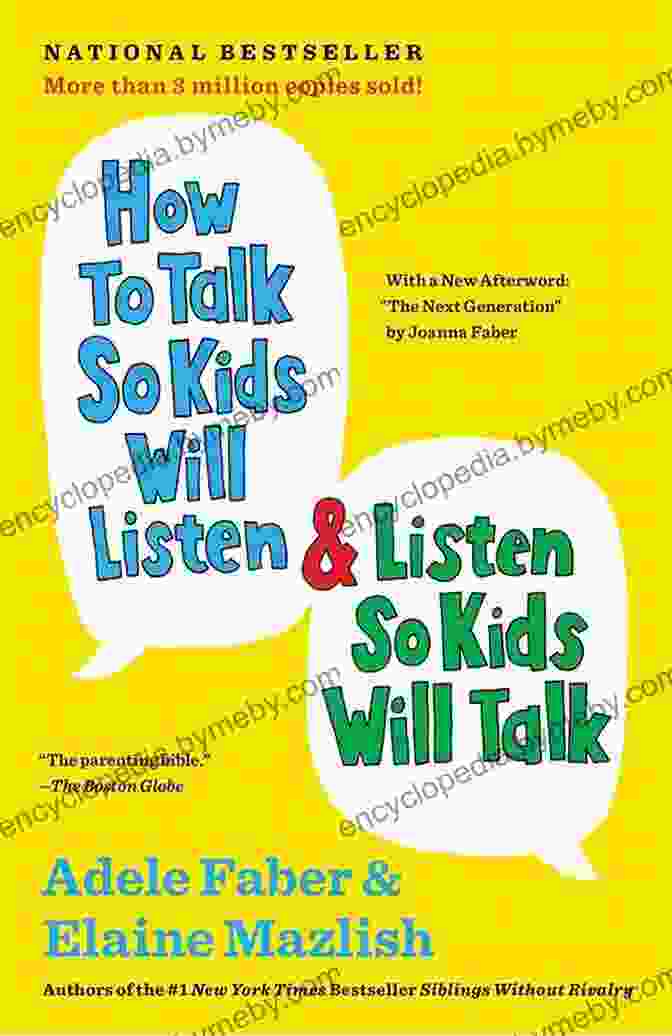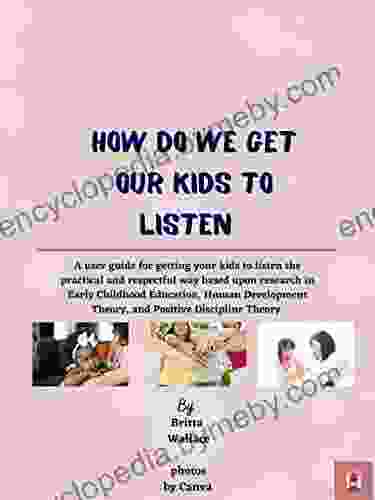How Do We Get Our Kids To Listen: Unlocking the Secrets of Effective Communication


Parenting is a rewarding yet challenging journey, and one of the most common obstacles parents face is getting their kids to listen. From toddlers who refuse to brush their teeth to teenagers who seem to have a mind of their own, it can be frustrating and disheartening when our attempts at communication fall on deaf ears.
4 out of 5
| Language | : | English |
| File size | : | 8458 KB |
| Text-to-Speech | : | Enabled |
| Screen Reader | : | Supported |
| Enhanced typesetting | : | Enabled |
| Word Wise | : | Enabled |
| Print length | : | 54 pages |
| Lending | : | Enabled |
But it doesn't have to be this way. In her groundbreaking book, "How Do We Get Our Kids To Listen," renowned child psychologist Dr. Susan Markel unveils the secrets of effective communication that will transform the way you interact with your children. Drawing on decades of research and clinical experience, Dr. Markel provides a practical and compassionate guide to help parents understand their children's developmental needs and establish a foundation of trust and respect that fosters active listening and cooperation.
Understanding Your Child's Developmental Needs
One of the key factors in getting your kids to listen is understanding their developmental needs. Children's brains and emotional regulation abilities are still under development, which means they may not always be able to process information or respond in ways that we expect. By tailoring our communication styles to their developmental stage, we can create a more receptive environment for listening.
For example, younger children may benefit from shorter sentences and concrete examples, while older children may appreciate more detailed explanations and opportunities to share their own perspectives. By being mindful of our children's developmental needs, we can adapt our communication to meet them where they are at.
Establishing a Foundation of Trust and Respect
Another crucial element of getting your kids to listen is establishing a foundation of trust and respect. When children feel heard, valued, and respected, they are more likely to be open to listening and cooperating. Here are some tips for fostering trust and respect in your親子关系关系relationship:
- Active listening: Show your child that you are genuinely interested in what they have to say by listening attentively, making eye contact, and asking clarifying questions.
- Validation: Acknowledge and validate your child's feelings, even if you don't agree with them. Let them know that it's okay to feel the way they do and that you understand their perspective.
- Respectful boundaries: Set clear and consistent boundaries, but do so in a respectful and age-appropriate manner. Explain why the boundaries are important and provide opportunities for your child to voice their opinions and negotiate.
- Quality time: Spend quality time with your child, engaging in activities that they enjoy and fostering a sense of connection and belonging.
Practical Communication Techniques
In addition to understanding your child's developmental needs and establishing a foundation of trust and respect, there are also a number of practical communication techniques that can help you get your kids to listen. Here are a few effective strategies:
- "I" statements: Use "I" statements to express your feelings and needs without blaming or accusing your child. For example, instead of saying "You always leave your toys on the floor," try "I feel frustrated when I have to clean up after you."
- Choice-giving: Give your child choices whenever possible, even in small matters. This empowers them and makes them more likely to cooperate. For example, instead of saying "It's time to get dressed," try "Would you like to wear the blue shirt or the red shirt?"
- Positive reinforcement: Reward your child for listening and cooperating with praise, affection, or small rewards. This reinforces positive behavior and motivates your child to continue listening.
- Consequences: While positive reinforcement is important, consequences may also be necessary for repeated misbehavior. Consequences should be age-appropriate, fair, and consistently applied.
Tips for Specific Age Groups
The strategies outlined above can be applied to children of all ages, but there are some specific tips that may be particularly helpful for certain age groups:
- Toddlers (1-3 years old): Use simple language, short sentences, and concrete examples. Be patient and repetitive, and provide plenty of opportunities for your child to explore and learn through play.
- Preschoolers (3-5 years old): Encourage your child to talk about their feelings and experiences. Ask open-ended questions and provide opportunities for storytelling and imaginative play.
- School-age children (6-12 years old): Engage your child in conversations about their interests, school, and friends. Foster critical thinking skills by asking questions and encouraging your child to share their opinions and perspectives.
- Teenagers (13-18 years old): Respect your teenager's independence and privacy, but make it clear that you are always there for them to talk. Encourage open communication by actively listening, validating their feelings, and providing guidance and support when needed.
Getting our kids to listen is not always easy, but it is possible by understanding their developmental needs, establishing a foundation of trust and respect, and using effective communication techniques. By following the strategies outlined in this article, you can create a more positive and cooperative親子关系relationship with your child, where active listening and open communication become the norm.
Remember, every child is unique, and there is no one-size-fits-all approach to parenting. Be patient, compassionate, and willing to adjust your strategies as your child grows and changes. With love, understanding, and effective communication, you can foster a strong and lasting bond with your child that will serve them well throughout their lives.
4 out of 5
| Language | : | English |
| File size | : | 8458 KB |
| Text-to-Speech | : | Enabled |
| Screen Reader | : | Supported |
| Enhanced typesetting | : | Enabled |
| Word Wise | : | Enabled |
| Print length | : | 54 pages |
| Lending | : | Enabled |
Do you want to contribute by writing guest posts on this blog?
Please contact us and send us a resume of previous articles that you have written.
 Book
Book Novel
Novel Page
Page Chapter
Chapter Text
Text Story
Story Genre
Genre Reader
Reader Library
Library Paperback
Paperback E-book
E-book Magazine
Magazine Newspaper
Newspaper Paragraph
Paragraph Sentence
Sentence Bookmark
Bookmark Shelf
Shelf Glossary
Glossary Bibliography
Bibliography Foreword
Foreword Preface
Preface Synopsis
Synopsis Annotation
Annotation Footnote
Footnote Manuscript
Manuscript Scroll
Scroll Codex
Codex Tome
Tome Bestseller
Bestseller Classics
Classics Library card
Library card Narrative
Narrative Biography
Biography Autobiography
Autobiography Memoir
Memoir Reference
Reference Encyclopedia
Encyclopedia Abigail Thomas
Abigail Thomas A J Angulo
A J Angulo Barbara Binder Kadden
Barbara Binder Kadden Roland Nyns
Roland Nyns J F Andrews
J F Andrews Martin Liebscher
Martin Liebscher Stephanie Corfee
Stephanie Corfee 9th Edition Kindle Edition
9th Edition Kindle Edition Abubakar Adam Ibrahim
Abubakar Adam Ibrahim Jennifer Berne
Jennifer Berne A C Grayling
A C Grayling Mark Sircus
Mark Sircus Caroline Kepnes
Caroline Kepnes Mary S Schaeffer
Mary S Schaeffer Matt Reiner
Matt Reiner Aaron Ehasz
Aaron Ehasz Lauren Wells
Lauren Wells Adam Lebor
Adam Lebor George R Milner
George R Milner 50minutos Es
50minutos Es
Light bulbAdvertise smarter! Our strategic ad space ensures maximum exposure. Reserve your spot today!

 Jimmy ButlerOrigami Airplanes by Paul Jackson: Your Gateway to the Fascinating World of...
Jimmy ButlerOrigami Airplanes by Paul Jackson: Your Gateway to the Fascinating World of... Ivan TurnerFollow ·15.4k
Ivan TurnerFollow ·15.4k Patrick HayesFollow ·19.2k
Patrick HayesFollow ·19.2k Gage HayesFollow ·2.4k
Gage HayesFollow ·2.4k Italo CalvinoFollow ·3.6k
Italo CalvinoFollow ·3.6k Eli BrooksFollow ·7.7k
Eli BrooksFollow ·7.7k Davion PowellFollow ·16k
Davion PowellFollow ·16k Asher BellFollow ·6k
Asher BellFollow ·6k Clay PowellFollow ·2.8k
Clay PowellFollow ·2.8k

 Timothy Ward
Timothy WardFearless Painting for True Beginners: Learn to Create...
Unlock the Joy of...

 Fernando Pessoa
Fernando PessoaProven 12-Step Program for Financial Peace of Mind:...
Are you struggling with...

 Chinua Achebe
Chinua AchebeLayers Colors Desire: Layers Colors Thoughts Mystery
A Literary Labyrinth...

 Fernando Bell
Fernando BellUnearth Hidden Treasures: Journey Through "Secondhand...
Prepare to embark on an extraordinary...

 Caleb Carter
Caleb CarterSymbolic Messages Garage Sale Mysteries: Unveiling the...
Welcome to the extraordinary world of the...

 Nikolai Gogol
Nikolai GogolTravels in the Billion Dollar Trash Trade: Uncovering the...
Ỡ In his...
4 out of 5
| Language | : | English |
| File size | : | 8458 KB |
| Text-to-Speech | : | Enabled |
| Screen Reader | : | Supported |
| Enhanced typesetting | : | Enabled |
| Word Wise | : | Enabled |
| Print length | : | 54 pages |
| Lending | : | Enabled |










